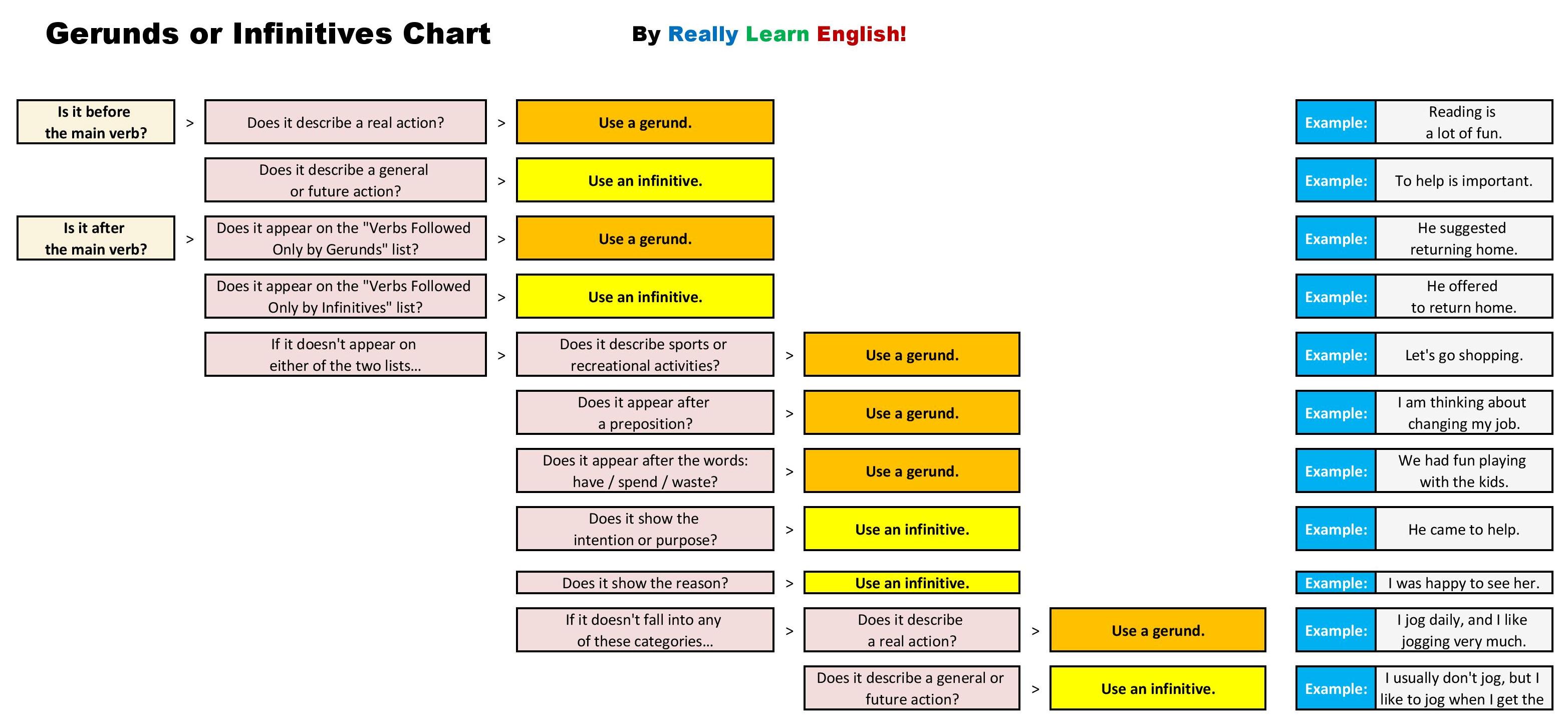
Exercise 1
Choose the correct infinitives and gerunds to complete the sentences below.Gerund
- Play this game to review Grammar. Do you enjoy to football matches? Preview this quiz on Quizizz. Infinitive with To DRAFT.
- Aug 03, 2016 This creative & engaging animated ESL video teaches learners about gerunds and infinitives (verbs) at the upper-intermediate level. Use this in class and hav.
We use the gerund (-ing)
1 When the verb is the subject of a sentence. Hp photosmart essential updates.
A gerund is a verb in its ing (present participle) form that functions as a noun that names an activity rather than a person or thing. Any action verb can be made into a gerund. Verbing (Present Participle) Add ing to most verbs. Play playing, cry crying, bark barking; For verbs that end in e, remove the e and add ing. 1629 Gerund after prepositions – Exercise 3; 1631 Gerund after prepositions – Exercise 4; 1615 Gerund and Infinitive – Exercise 1; 1621 Gerund and Infinitive – Exercise 2; 1625 Gerund as subject or object – Exercise; 1623 Gerund or Progressive; 1611 Infinitive of English verbs – Test; 1617 Infinitive or Gerund after verbs; Exercises.
- Reading on tablets and phones isn't very good for your eyes.
2After a preposition.
- I'm tired of waiting. Let's go home.
3 After some verbs.
- I don't mind waiting.
- She recommended visiting this museum.
Common verbs followed by a gerund
Some common verbs that are followed by gerund are: avoid, enjoy, finish, hate, keep, like, love, don't mind, prefer, recommend, spend time, stop, suggest, etc.
Negative gerund
The negative form of the gerund is not +-ing.
- He enjoys not having to wake up early at weekends.
Infinitive without to
We use the infinitive without to
1 After the auxiliary verb do, does, did in negative sentences and questions.
- He didn't say anything.
- Does Tim work with you?
- I don't believe you.
2 After modal verbs (will, can, must, should, might, may,etc.)

- You should come with us.
- I can't play the guitar.


Exercise 1
Choose the correct infinitives and gerunds to complete the sentences below.Gerund
- Play this game to review Grammar. Do you enjoy to football matches? Preview this quiz on Quizizz. Infinitive with To DRAFT.
- Aug 03, 2016 This creative & engaging animated ESL video teaches learners about gerunds and infinitives (verbs) at the upper-intermediate level. Use this in class and hav.
We use the gerund (-ing)
1 When the verb is the subject of a sentence. Hp photosmart essential updates.
A gerund is a verb in its ing (present participle) form that functions as a noun that names an activity rather than a person or thing. Any action verb can be made into a gerund. Verbing (Present Participle) Add ing to most verbs. Play playing, cry crying, bark barking; For verbs that end in e, remove the e and add ing. 1629 Gerund after prepositions – Exercise 3; 1631 Gerund after prepositions – Exercise 4; 1615 Gerund and Infinitive – Exercise 1; 1621 Gerund and Infinitive – Exercise 2; 1625 Gerund as subject or object – Exercise; 1623 Gerund or Progressive; 1611 Infinitive of English verbs – Test; 1617 Infinitive or Gerund after verbs; Exercises.
- Reading on tablets and phones isn't very good for your eyes.
2After a preposition.
- I'm tired of waiting. Let's go home.
3 After some verbs.
- I don't mind waiting.
- She recommended visiting this museum.
Common verbs followed by a gerund
Some common verbs that are followed by gerund are: avoid, enjoy, finish, hate, keep, like, love, don't mind, prefer, recommend, spend time, stop, suggest, etc.
Negative gerund
The negative form of the gerund is not +-ing.
- He enjoys not having to wake up early at weekends.
Infinitive without to
We use the infinitive without to
1 After the auxiliary verb do, does, did in negative sentences and questions.
- He didn't say anything.
- Does Tim work with you?
- I don't believe you.
2 After modal verbs (will, can, must, should, might, may,etc.)
- You should come with us.
- I can't play the guitar.
to + infinitive
We use the infinitive with to
1 After adjectives.
- It's important to arrive early at the station.
2 To express a reason or purpose (why).
- I went to Madrid to visitsome family.
- I need time to study for the exam.
Gerunds And Infinitives Games Ppt
3 After question words.
- I don't know what to eat.
- I want to learn how to play the guitar.
Gerund Vs Infinitive Spanish
4 After some verbs.
Gerund Vs Infinitive Games
- Don't forget to call me.
- She seems to bedistracted.
Common verbs followed by to + infinitive
Some common verbs that are followed by toinfinitive are: decide, forget, help, hope, learn, need, offer, plan, promise, remember, seem, try, want, would like, would love, would hate, would prefer, etc.
Negative form of to + infinitive
Gerunds And Infinitives Rules
The negative form of to + infinitive is not to + infinitive.
Gerund And Infinitive Activities Pdf
- She decided not to enter the competition.
